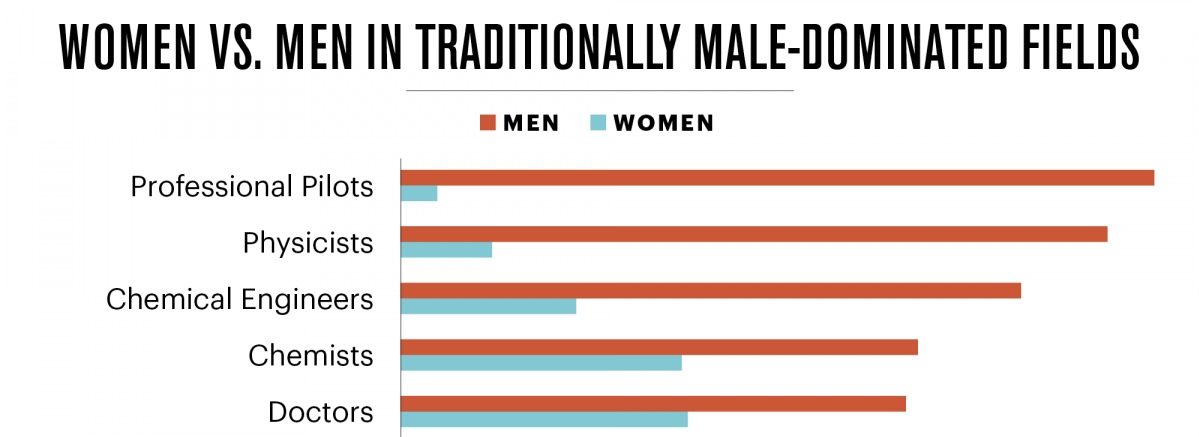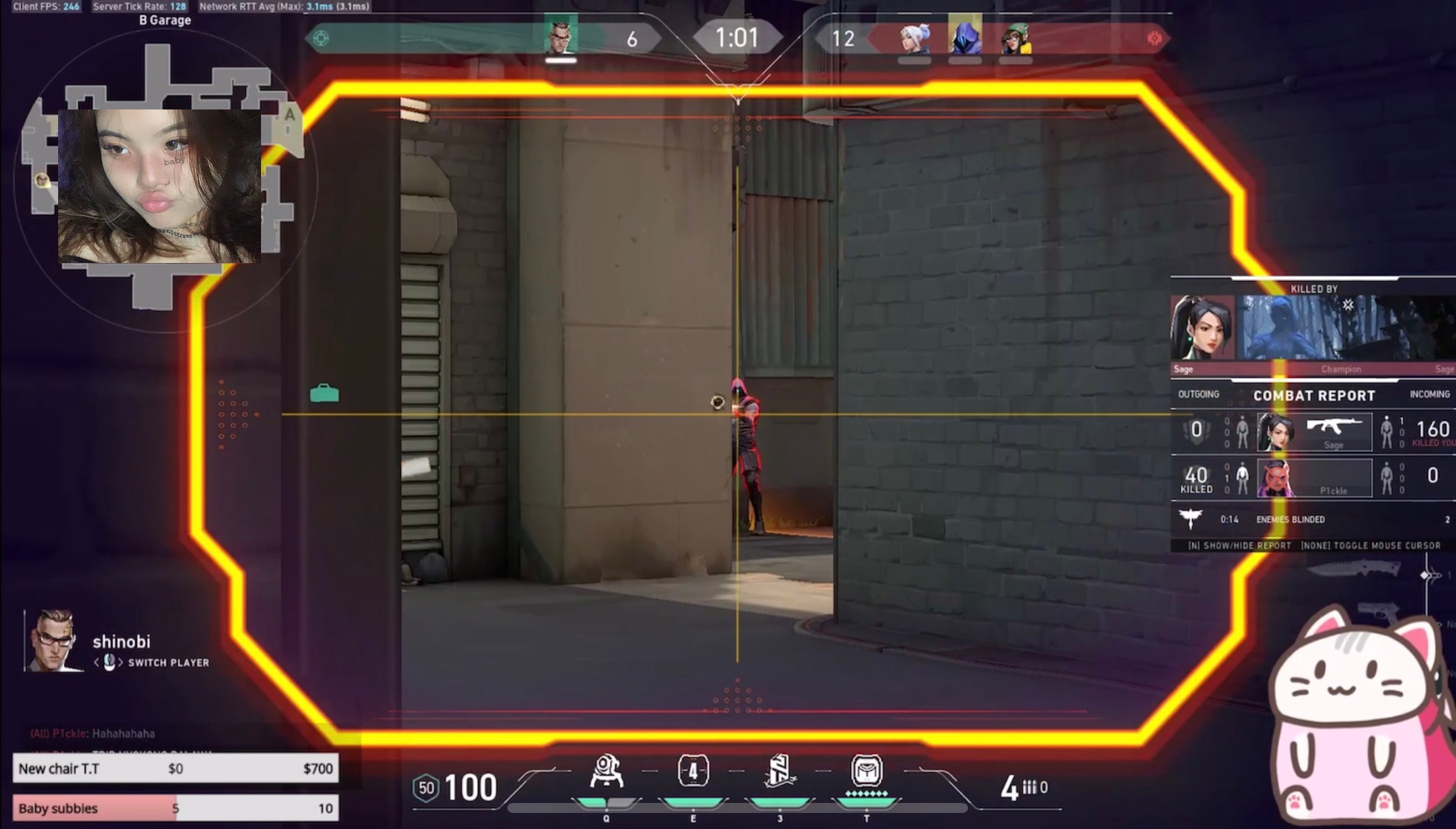Yes, Women Can Do It Too
As society’s views progress over time, an increasing number of young women are breaking into traditionally male-dominated professions. Genevieve Sia speaks to three women who are changing the scene.
During World War II, the iconic Rosie the Riveter “We Can Do It” poster inspired women to enter the workforce. From 1940 to 1945, the percentage of females employed increased by 10 per cent. Photo taken from The Conversation.
BY
Genevieve Sia
Publicity Manager
Hype Issue #54
Published on
February 1, 2022
In a study conducted by economist Jessica Pan for the Ministry of Manpower, most higher-paying job positions are still dominated by men.
Take the aviation industry for example. Despite making tremendous strides over the years, the aviation industry is still underrepresented as women make up only five per cent of all pilots globally. Other male-dominated industries include information technology, the maritime industry as well as politics.

Although progress has been made to bridge the gender gap in the workforce, we are still far from equality in terms of treatment and opportunities. Photo taken from Seattle Business Magazine.
Over the decades, progress has been made in this area as more and more women are stepping into these seemingly “intimidating” and “unladylike” male-dominated industries. As of January 2022, an estimated three out of 10 employees working in the engineering sector are women. Additionally, more women have started to serve as pilots for commercial airlines in a bid to stem the shortage of pilots.

There are no careers exclusive to a particular gender. Both males and females should be encouraged to delve into whatever industry they are passionate about. Photo taken from Ngee Ann Polytechnic.
Serene Li, 19, a student studying Aerospace Electronics at Ngee Ann Polytechnic, is a thorn amongst the roses as she is the only female student in her class.
When asked why she chose to study in a male-dominated field, Serene said: “I’ve always been interested in the aviation industry, and this course allowed me to learn more about it. I never really bothered about the gender ratio.”
Shahlis Rosli, 19, a student at Temasek Polytechnic’s Aerospace Electronics, also shared similar sentiments, attributing it to her passion for the aerospace industry.
Yet, if passion is such a significant factor, why do some females still stray away from such professions? After all, one of the world’s most famous aviators in history, Amelia Earhart, was also a woman too. A study done by Catalyst concluded it was due to the following reasons.
1. Lack of a Sense of Belonging
Many women avoid such industries due to their fear of being alone. No matter how good their relationship with their male colleagues may be, both genders deal with very different experiences in the workplace at the end of the day. After all, they say that women are from Venus and men are from Mars, hence, it’s just different.
“I can understand why other females would not want to pursue a career in a male-dominated area. I was nervous at the start too. Before getting to know others and eventually fitting in, the initial stares from people can be quite scary. I can’t imagine how it would be for people with any form of social anxiety. Feeling out of place because of your gender is not comfortable at all,” said Serene.
“Changing careers can be a hassle. You make your bed and sleep in it, you know? So it’s safer to just stick with something you are familiar with, and for most women, it’s not in these [male-dominated] industries,” she added.
2. Pervasive Stereotypes
According to past traditions, women have been unfairly given the title as weak damsels who are less capable compared to their male counterparts when dealing with laborious work. Such beliefs have evolved into stereotypes and been passed down from generation to generation.
In many cultures, women are still seen as “too weak” or “only good as housewives”. The consequences of such stereotypes can be potentially damaging to their mental health and hinders their efforts to break such stereotypes in the workplace.
“I’ve been told things like ‘go back to the kitchen’. Although I’m used to such comments, it does sting for a second. Words are easy to say, but they can really affect a person. If someone is not doing well, why not encourage them instead so they feel better?” said Celsy (not her real name), 20, a professional gamer.
When asked what her biggest struggle was, Celsy said it was proving her worth. “Everyone has bad days, but it’s hard to prove your worth when you don’t perform.”
Having been a professional gamer since 2021, Celsy is certainly not a stranger to the prejudice and sexism that comes with exposing her identity online as a professional gamer.

Celsy (not her real name) gunning down her enemy in a twitch stream. Photo by Genevieve Sia.
3. Sexual Harassment
In a 2017 survey done by Parker Kim, 49 per cent of females who work in male-dominated industries believe that sexual harassment is a problem. In addition, 28 per cent of them have personally experienced it. This is in comparison to the 20 per cent of women who have been sexually harassed in female-dominated industries.
Research done by the Association of Women for Action and Research Singapore (AWARE) revealed that the short-term effects of sexual assault include being less productive at work and having a lower job satisfaction. In the long-term, women have also quit their jobs for lower paying ones or left the industry all at once.
As part of its efforts to provide support for women in Singapore, AWARE urges organisations to implement an anti-harassment policy which assures victims they are protected and encourages them to report incidents of sexual assault.
It’s also important to note that many professional female gamers or streamers face sexual harassment from male gamers. At best, they’re told to “get good” while on stream. At their worst, they face harassment and abuse from disrespectful male gamers in the form of sexist remarks.
Negaoryx, 29, a female gamer shared in an interview with Hello Giggles that sometimes these sexist remarks can range from “light flirtations” to dropping off the team in an attempt to avoid gaming with female players. However, she has also experienced blatant “[sexual] harassment or threats”.
In a 2020 study done by Channel News Asia, it was reported that over 100 gamers, mostly comprising of women, were sexually assaulted and discrimated against.
Some professional female gamers often have to rely on physical attractiveness and sex appeal to earn a higher income from a largely repressed male audience that sexually objectifies them. Take TikToker and video game streamer Belle Delphine, 22, for example, whose livestreaming career saw thousands of men buying her used, ‘gamer girl bath water’ in bottles for $30 each in 2019.
While Belle might be among the women who feel comfortable with monetising their sex appeal, others who may not feel the same way find themselves getting inappropriately harassed by people on the Internet.
4. Unfair Treatment in the Workplace
Every day, women are fighting for a chance to be heard in the workplace. Bias is prevalent and unavoidable in their everyday lives. It can develop based on existing stereotypes or can even be displayed unconsciously. Gender bias in particular creates prejudice against women in male-dominated industries, leading to inequality in the workplace.
Only 48 per cent of women who work in workplaces with a male majority feel they are treated fairly in terms of recruitment and hiring, while only 38 per cent say that they are considered fairly for promotions and advancements.
On the other hand, 79 per cent of women who work in workplaces with a female majority reported that they are treated equally when it comes to recruitment and hiring. Furthermore, 70 per cent feel that opportunities for promotion and advancement are fair.
The difference between the two is staggering and goes to show the underlying gender bias in our society.
So, why did these women choose to stay on this path? Serene said it was because of the support she received from her family and her amicable classmates. “In the beginning, I felt out of place when I was the only girl for certain lessons in school. I was afraid that the guys would not welcome me, but they were thoughtful and helpful. It just takes some time getting used to. My parents were also extremely supportive.”
Shahlis also agreed: “[Male classmates] are willing to lend a helping hand when needed. They don’t feel ashamed if they require help from their female classmates as well.”
Thankfully for Serene and Shahlis, their experiences with their male classmates in their courses have been uplifting. However, from the statistics that we have observed, unfair treatment in the workplace is still a huge concern for them and many aspiring women who are pursuing careers in male-dominated industries.
5. “You Are Just A Girl”
For the three interviewees, this phrase has become a form of encouragement rather than an insult. Female or male, the end goal is still success. Stereotypes and gender biases aside, times have changed. Who’s to say that women cannot achieve just as much as men?
“Your gender should never act as an obstacle against what you can or cannot do. We are all humans. We all have the ability to do the same things as long as we put in an equal amount of effort,” said Serene.
Your gender should never act as an obstacle against what you can or cannot do. We are all humans. We all have the ability to do the same things as long as we put in an equal amount of effort.
After all, it was women who filled male-dominated factory jobs during the second World War as many men were drafted. Think about Rosie the Riveter, the famous Norman Rockwell poster that became the mainstream face of modern feminism. Now, the question lies here: Can the patriarchy put down its pride and recognise that women have always been just as capable?

Women stepped up to fill the gaps in the workforce while men were away at war. Photo taken from History.
A woman’s strength and acumen have always been necessities in many fields. For example, according to Harvard Business Review, gender and racial diversity improve the financial performance of companies. If companies want to solve their problems, having different perspectives such as those from women can greatly improve a company’s productivity.
With reference to the law of the instrument, “If all you have is a hammer, everything looks like a nail”. Every problem is likely to be solved the same way when analysed by people of the same gender with similar psychographics. In order to achieve a toolbox filled with various options, we need to have a well balanced workforce.

Can you be more specific about the content of your article? After reading it, I still have some doubts. Hope you can help me.
After reading your article, it reminded me of some things about gate io that I studied before. The content is similar to yours, but your thinking is very special, which gave me a different idea. Thank you. But I still have some questions I want to ask you, I will always pay attention. Thanks.
… [Trackback]
[…] Read More Info here on that Topic: hypesingapore.com/index.php/2022/02/01/yes-women-can-do-it-too/ […]
… [Trackback]
[…] There you will find 5462 more Information on that Topic: hypesingapore.com/index.php/2022/02/01/yes-women-can-do-it-too/ […]
… [Trackback]
[…] Read More here on that Topic: hypesingapore.com/index.php/2022/02/01/yes-women-can-do-it-too/ […]
… [Trackback]
[…] Info to that Topic: hypesingapore.com/index.php/2022/02/01/yes-women-can-do-it-too/ […]
… [Trackback]
[…] Find More to that Topic: hypesingapore.com/index.php/2022/02/01/yes-women-can-do-it-too/ […]
best of jazz
… [Trackback]
[…] Read More to that Topic: hypesingapore.com/index.php/2022/02/01/yes-women-can-do-it-too/ […]
… [Trackback]
[…] Read More here to that Topic: hypesingapore.com/index.php/2022/02/01/yes-women-can-do-it-too/ […]
… [Trackback]
[…] Read More Info here to that Topic: hypesingapore.com/index.php/2022/02/01/yes-women-can-do-it-too/ […]
… [Trackback]
[…] Read More to that Topic: hypesingapore.com/index.php/2022/02/01/yes-women-can-do-it-too/ […]
… [Trackback]
[…] Information on that Topic: hypesingapore.com/index.php/2022/02/01/yes-women-can-do-it-too/ […]
… [Trackback]
[…] Read More on to that Topic: hypesingapore.com/index.php/2022/02/01/yes-women-can-do-it-too/ […]
… [Trackback]
[…] There you will find 84063 additional Info to that Topic: hypesingapore.com/index.php/2022/02/01/yes-women-can-do-it-too/ […]
… [Trackback]
[…] Information on that Topic: hypesingapore.com/index.php/2022/02/01/yes-women-can-do-it-too/ […]
… [Trackback]
[…] Read More to that Topic: hypesingapore.com/index.php/2022/02/01/yes-women-can-do-it-too/ […]
… [Trackback]
[…] Find More on on that Topic: hypesingapore.com/index.php/2022/02/01/yes-women-can-do-it-too/ […]
… [Trackback]
[…] Find More on that Topic: hypesingapore.com/index.php/2022/02/01/yes-women-can-do-it-too/ […]
… [Trackback]
[…] Info on that Topic: hypesingapore.com/index.php/2022/02/01/yes-women-can-do-it-too/ […]
… [Trackback]
[…] Find More Information here to that Topic: hypesingapore.com/index.php/2022/02/01/yes-women-can-do-it-too/ […]
… [Trackback]
[…] Read More on on that Topic: hypesingapore.com/index.php/2022/02/01/yes-women-can-do-it-too/ […]
… [Trackback]
[…] Find More on to that Topic: hypesingapore.com/index.php/2022/02/01/yes-women-can-do-it-too/ […]
… [Trackback]
[…] Read More here to that Topic: hypesingapore.com/index.php/2022/02/01/yes-women-can-do-it-too/ […]
… [Trackback]
[…] There you will find 42681 more Info to that Topic: hypesingapore.com/index.php/2022/02/01/yes-women-can-do-it-too/ […]
… [Trackback]
[…] Find More Information here to that Topic: hypesingapore.com/index.php/2022/02/01/yes-women-can-do-it-too/ […]
… [Trackback]
[…] Find More on that Topic: hypesingapore.com/index.php/2022/02/01/yes-women-can-do-it-too/ […]
… [Trackback]
[…] Here you will find 43095 additional Information on that Topic: hypesingapore.com/index.php/2022/02/01/yes-women-can-do-it-too/ […]
… [Trackback]
[…] There you will find 38734 additional Info on that Topic: hypesingapore.com/index.php/2022/02/01/yes-women-can-do-it-too/ […]
… [Trackback]
[…] Read More on to that Topic: hypesingapore.com/index.php/2022/02/01/yes-women-can-do-it-too/ […]
… [Trackback]
[…] Find More Info here to that Topic: hypesingapore.com/index.php/2022/02/01/yes-women-can-do-it-too/ […]
… [Trackback]
[…] Read More on that Topic: hypesingapore.com/index.php/2022/02/01/yes-women-can-do-it-too/ […]
… [Trackback]
[…] There you can find 96517 more Info on that Topic: hypesingapore.com/index.php/2022/02/01/yes-women-can-do-it-too/ […]
… [Trackback]
[…] Find More here on that Topic: hypesingapore.com/index.php/2022/02/01/yes-women-can-do-it-too/ […]
… [Trackback]
[…] Read More to that Topic: hypesingapore.com/index.php/2022/02/01/yes-women-can-do-it-too/ […]
… [Trackback]
[…] Read More to that Topic: hypesingapore.com/index.php/2022/02/01/yes-women-can-do-it-too/ […]
Your point of view caught my eye and was very interesting. Thanks. I have a question for you.
Thank you very much for sharing, I learned a lot from your article. Very cool. Thanks.
Thank you for your sharing. I am worried that I lack creative ideas. It is your article that makes me full of hope. Thank you. But, I have a question, can you help me? https://accounts.binance.com/en-NG/register?ref=JHQQKNKN